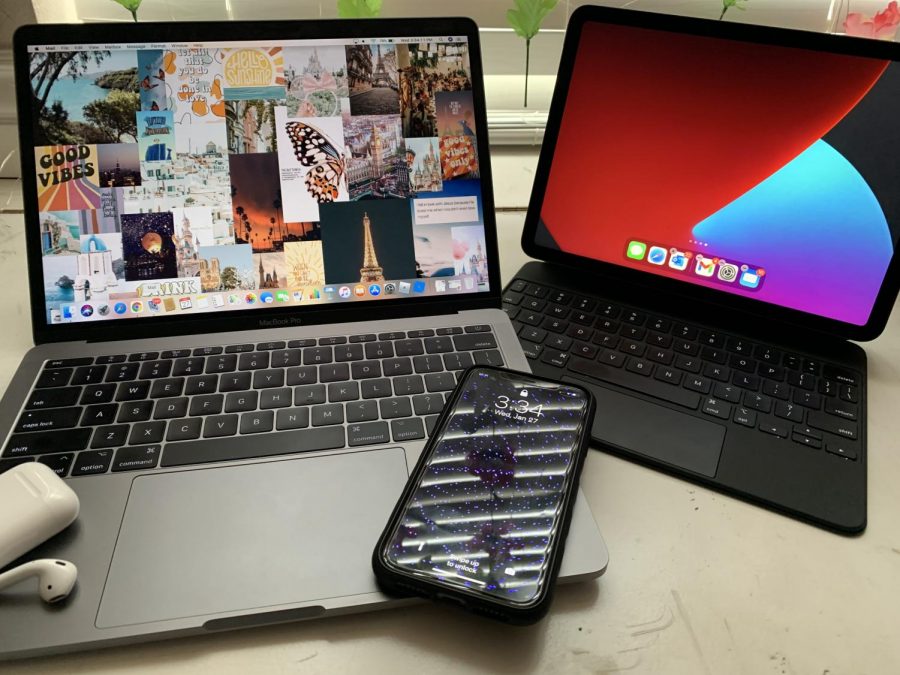Influence of Technology on Teens
The many different types of technology devices we are able to use.
Instagram, Snapchat, Facebook, and Twitter. Most of us use at least one of these social media platforms every day. But many people do not know the negative effects social media can have on teenagers. Social media can lower your self-esteem and play a significant role in shaping the lifestyles and personalities of teenagers.
This topic also brings to light the fight between good and evil. There are amazing, positive things about technology, but there are also many horrific, negative things. And that is always terrifying. I believe that if we can educate ourselves about proper use of technology to avoid bad things, life would be more enjoyable and happy. Here are a few suggestions to help us find solutions to our technological problems.
Let me get started by saying that not all technology is bad. It is the ways you use it that will make an impact on your life. Technology can be positive, empowering, and inspiring. You can help harness that potential by posting inspirational quotes or uplifting messages. This may not only feel empowering for you, but it could also help inspire your friends. By having these types of conversations, an opportunity arises to teach how to build someone’s self-worth from the inside out. You can help give anyone an opportunity to shine and get that sense of empowerment and accomplishment outside of the way they look.
What most teens don’t see is how much of an impact social media has on their self-esteem and time management. In today’s social networking, teens are worried about how many “likes” they can get, or how many followers they gain, even though none of it actually matters. We view likes as popularity and worth, while it is really just our imagination that is causing us to think this, and also the worst about everything and everyone. These statistics from the article “Teens and Technology” by Gale Resources states that, “95 percent of U.S. children between the ages of 13 and 17 have access to smartphones. Out of those polled, 45 percent said they were online ‘almost constantly.’”
A study from the University of Michigan collected data about Facebook users and how it correlates with their moods. Simply put, they found that the more avid users were overall less happy than those who used the site less. Over more time, avid users also reported lower satisfaction in their quality of life.
The Pew Research Center in their 2018 survey of technology use they say, “Given the opportunity to explain their views in their own words, teens who say social media has had a mostly positive effect tend to stress issues related to connectivity and connection with others. Some 40% of these respondents said that social media has had a positive impact because it helps them keep in touch and interact with others. Many of these responses emphasize how social media has made it easier to communicate with family and friends and to connect with new people. There is slightly less consensus among teens who say social media has had a mostly negative effect on people their age. The top response (mentioned by 27% of these teens) is that social media has led to more bullying and the overall spread of rumors. Meanwhile, 17% of these respondents feel these platforms harm relationships and result in less meaningful human interactions. Similar shares think social media distorts reality and gives teens an unrealistic view of other people’s lives (15%), or that teens spend too much time on social media (14%).”
I Personally have set limits for myself so I can only be on social media for a half an hour and any other game for one hour. Doing this has helped me in being able to disconnect and improve my real world relationships. Instead of being on my phone, I could help others, read a book, go for a run, or paint. I feel empowered by setting time limits on my phone. I’m enjoying all this time I have. My phone used to be such a distraction that it harmed my relationships. And just think, you can do this on your own phone. It doesn’t take much. Just a single step to do it. I will promise you that it will not only make your connections and relationships stronger, it will just make you feel so free and enjoy life so much more.
Many parents demonize technology and panic about the effects that it may be having on their children, mainly because the technology is new to them and not central to their lifestyles. Technology of all sorts has the power to shape society in many ways. The long-term impact of the widespread use of technology by today’s teenagers has yet to be determined. In the article from Gale Resources, “The Smartphone Generation,” it says, “Apple’s new operating system will allow parents to monitor their children’s use of their phones more effectively and to set daily time limits on some apps. Google has made similar changes. And Microsoft has launched an initiative to improve the use of digital technology in schools, so that it becomes less of a distraction for students and more a tool for learning.” This is amazing! Even the biggest companies in the world are taking a stand and making improvements to help everyone out and to be able to take that first step in proving people wrong.
These are some ways you can help the world and improve this problem in your life today. First, don’t only monitor the quantity of time that you spend on social accounts. The quality of the social media activities that engage in can clearly impact a person’s self-esteem and well-being. Both the quantity and quality of time spent online are important. Second, is to encourage yourself to engage in only positive social media activities, such as viewing your own profiles, the profiles of relatives, or fostering your interests. Also, you could try to set limits for how much time you are spending. One final suggestion, is to let yourself know that you should take what you see on your social media feeds with a grain of salt. To some degree, everyone reflects the good in their lives and filters out failures in their profiles.











Dante • Mar 4, 2021 at 11:52 AM
negative is bad so i think we should limit time on social media, but thats at least what i will do
Anna • Feb 4, 2021 at 11:43 AM
I agree that social media and being on your phone in general does effect our mental health.
Kelton Cobbley • Feb 4, 2021 at 7:56 AM
I see a lot of people who waste their lives away playing video games and spending hours on phones. There is a lot of negative things on social media and especially in todays world its super crazy and there is just too much negative.